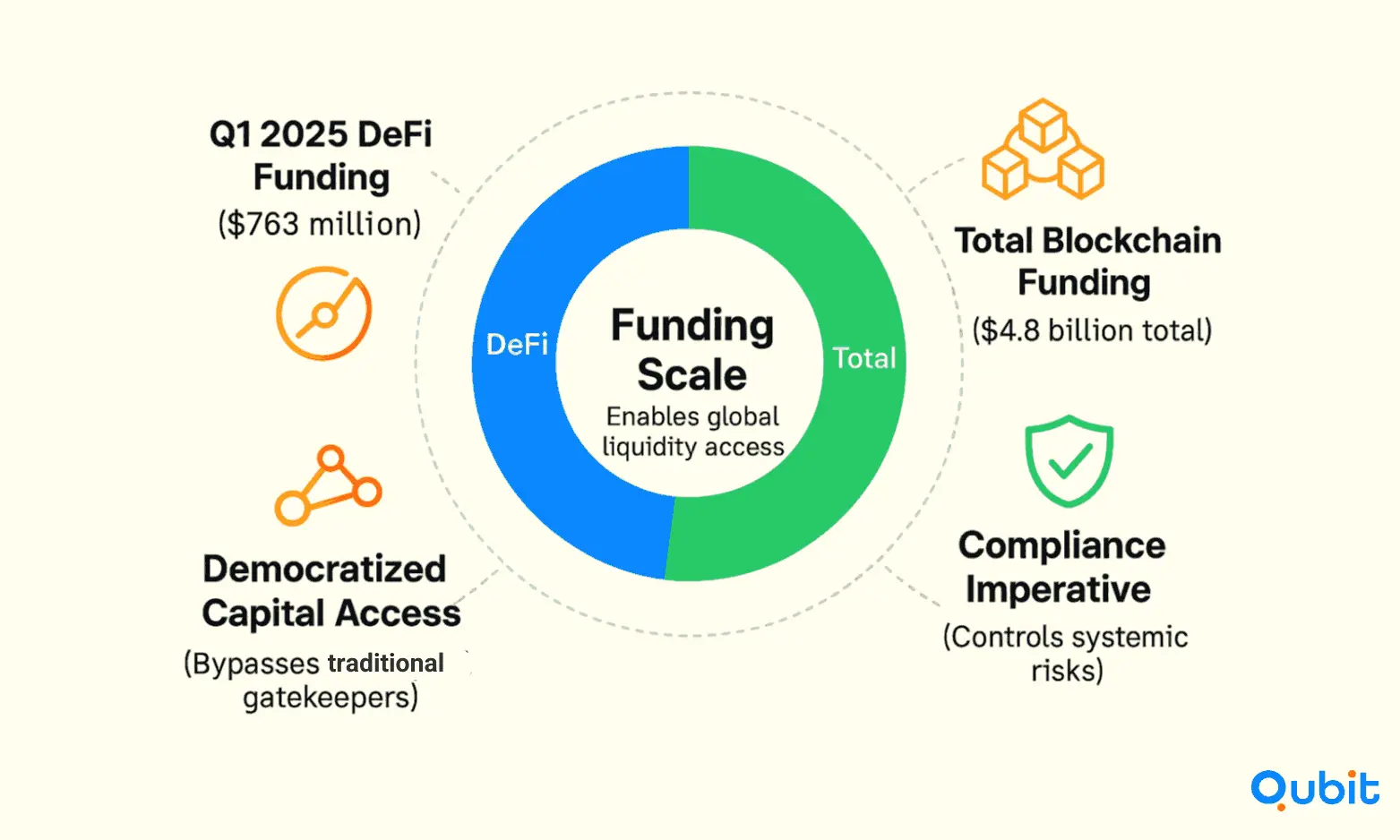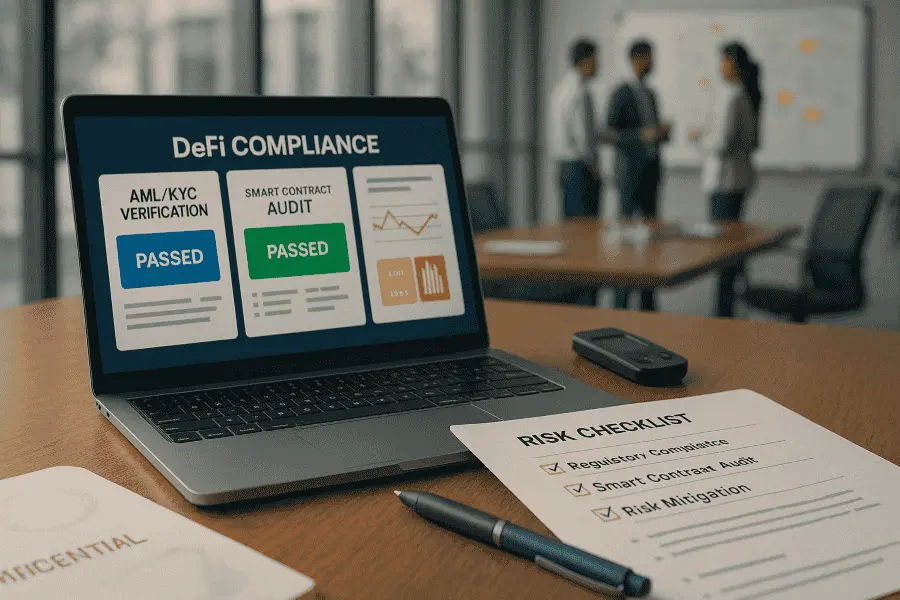The DeFi revolution has unlocked new avenues for blockchain startups to raise capital, but it’s also brought a complex landscape of risk and compliance. As a founder, you must balance innovation with operational resilience, regulatory clarity, and investor trust. In 2025, this balance is more critical than ever. Regulatory frameworks like MiCA, DORA, and new IRS and Treasury rules are reshaping how DeFi projects operate and raise funds, especially in the US and Europe.
This article is your comprehensive guide to navigating these challenges, with actionable strategies and internal links to help you build a compliant, resilient DeFi fundraising engine.
The DeFi Opportunity and Compliance Imperative

DeFi has democratized access to capital, enabling blockchain startups to bypass traditional gatekeepers and tap into global liquidity pools. In Q1 2025 alone, DeFi projects raised over $763 million, accounting for a significant share of the $4.8 billion in total blockchain startup funding.
But with this opportunity comes heightened scrutiny. Regulators are tightening reporting, tax, and operational requirements, while institutional investors are demanding robust risk management before allocating capital. As a founder, your ability to manage risk and compliance is now a core determinant of your fundraising success.
Understanding the Regulatory Landscape for DeFi Fundraising
The regulatory environment for DeFi is evolving rapidly. Europe’s Markets in Crypto-Assets Regulation (MiCA), the Digital Operational Resilience Act (DORA), and the Directive on Security of Network and Information Systems (NIS2) are setting new standards for cybersecurity, operational resilience, and investor protection.
In the US, the IRS and Treasury have introduced new tax reporting rules, including Form 1099-DA, stricter cost basis tracking, and lower reporting thresholds for digital asset transactions.
Key compliance requirements for DeFi fundraising in 2025:
- Secure key management and rapid incident reporting
- Third-party risk monitoring and operational resilience
- Transparent tax reporting and basis tracking for all token transactions
- Anti-abuse measures to prevent obfuscation of gains and losses
Stay updated on regulatory changes in your target fundraising markets. Build relationships with legal advisors who specialize in DeFi and digital assets. We at Qubit Capital provide expert Fundraising Assistance to help navigate complex financing landscapes. Let’s connect and explore how we can support your journey toward success.
Core Risks in DeFi Capital Raising and How to Manage Them
1. Smart Contract Vulnerabilities
Smart contracts are the backbone of DeFi fundraising, but they’re also a top risk. In 2024, DeFi hacks and exploits resulted in over $1.5 billion in losses. Vulnerabilities in token sale contracts, liquidity pools, or governance modules can destroy trust overnight.
Mitigation strategies:
- Invest in third-party security audits before launching any fundraising contract.
- Establish a bug bounty program to incentivize white-hat disclosures.
- Use modular, well-tested contract libraries.
- Learn from the case studies in DeFi funding models, where security-first projects consistently attract more capital.
2. Regulatory Non-Compliance
New reporting and tax rules are now strictly enforced. The IRS requires brokers and some DeFi platforms to report all digital asset sales above $600 using Form 1099-DA, with cost basis tracking set to become mandatory by 2026.
Mitigation strategies:
- Implement KYC/AML procedures, even if your protocol is permissionless.
- Track all token swaps, staking rewards, and liquidity pool transactions for accurate tax reporting.
- Consult with tax professionals to ensure compliance with US, EU, and other relevant jurisdictions.
- For a deeper dive, see how DeFi investment trends are influencing compliance expectations.
3. Third-Party and Oracle Risks
DeFi fundraising often relies on oracles and third-party infrastructure. These dependencies introduce external risks.
Mitigation strategies:
- Use decentralized, redundant oracle networks.
- Monitor third-party service providers for operational reliability and regulatory standing.
- Have contingency plans for oracle failure or manipulation.
4. Investor Protection and Governance
Decentralized fundraising can expose projects to governance attacks or rug pulls. Institutional investors are especially wary of projects without clear legal enforceability or robust governance.
Mitigation strategies:
- Design transparent, on-chain governance with clear voting and proposal mechanisms.
- Lock team and advisor tokens with vesting schedules.
- Publish regular, auditable reports on treasury management and protocol upgrades.
Taxation and Reporting, What Every DeFi Founder Must Know
The IRS and Treasury’s final regulations now require detailed reporting for DeFi fundraising activities, including token sales, swaps, staking rewards, and liquidity pool participation. The reporting threshold for NFTs and stablecoins is now just $600, and brokers must issue Form 1099-DA for all qualifying transactions.
Token Swaps and Sales
Swapping one token for another is a taxable event. You must track the fair market value at the time of the swap and report gains or losses.
Staking and Yield Rewards
Staking rewards are taxed as ordinary income when received, and subsequent sales are subject to capital gains tax. Accurate record-keeping is essential.
Liquidity Pools
Depositing or withdrawing from a liquidity pool can trigger taxable events. Rewards from fees are ordinary income, and all transactions must be tracked for compliance. For more, see DeFi liquidity funding for how liquidity pools affect both funding and compliance.
Airdrops and Bonuses
Airdropped tokens and referral bonuses are taxed as income when received, with subsequent sales triggering capital gains events.
Tip: Use automated tax tracking tools and consult professionals to avoid costly errors.
Institutional Capital and the Compliance Disconnect
Despite technical progress, institutional capital is still cautious about DeFi. The main barrier is legal enforceability and unresolved regulatory risk. While asset managers and hedge funds are active, pensions and endowments are waiting for clearer standards.
What founders should do:
- Build compliance into your protocol from day one.
- Document all legal opinions, audits, and compliance frameworks.
- Engage with institutional investors to understand their risk thresholds and reporting needs.
See institutional DeFi investment for more on what institutions expect.
Best Practices for DeFi Fundraising Compliance
1. Proactive Legal and Regulatory Monitoring
Monitor global regulatory developments and adapt your fundraising model accordingly. Engage legal counsel familiar with DeFi and digital asset law.
2. Transparent Governance and Community Engagement
Adopt transparent, on-chain governance with regular community updates. Use DAOs or similar structures to align incentives and build trust.
3. Security-First Protocol Design
Prioritize security audits, bug bounties, and modular contract architecture. Publicly disclose audit results and remediation steps.
4. Comprehensive Record-Keeping
Maintain detailed records of all fundraising transactions, token distributions, and treasury movements. This supports both tax compliance and investor reporting.
5. Cross-Border Compliance
If you’re raising capital globally, ensure your protocol complies with local securities, tax, and AML laws. Consider geofencing or restricting access in high-risk jurisdictions.
Conclusion
Raising capital via DeFi is no longer the regulatory “wild west.” In 2025, founders must navigate a complex matrix of operational, legal, and tax risks to build trust with both retail and institutional investors. By prioritizing security, compliance, and transparent governance, you can turn regulatory challenges into a competitive advantage.
The DeFi projects that thrive will be those that treat risk management as a core product feature, not an afterthought. Build compliance into your DNA, and you’ll be well positioned to access global capital and scale with confidence.
If you’re looking to court institutions without losing community credibility, at Qubit we understand disclosures, reporting cadence, and treasury policy. Advance confidently with our fundraising assistance for blockchain startups.
Key Takeaways
- DeFi fundraising is under intense regulatory scrutiny in 2025, with new rules in the US and Europe.
- Smart contract security, tax compliance, and transparent governance are essential to attract capital and avoid penalties.
- Institutional investors demand legal clarity and robust risk management before participating in DeFi funding rounds.
- Automated tools, third-party audits, and proactive legal monitoring are now baseline requirements for serious DeFi projects.
- Cross-border compliance and rigorous record-keeping are critical for long-term fundraising success.
Frequently asked Questions
What are the biggest compliance risks for DeFi fundraising in 2025?
Smart contract vulnerabilities, regulatory non-compliance, and poor record-keeping are the top risks. New IRS and EU rules require detailed reporting and operational resilience.






